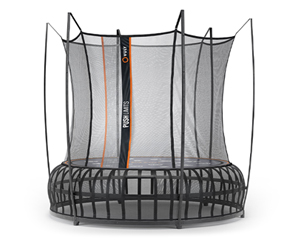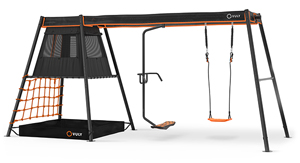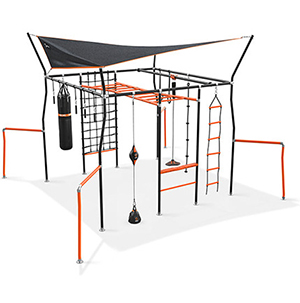Jungle Gym vs. Monkey Bars vs. Climbing Frames: What's the Difference?
Aug 24, 2023
3 mins
Over the years, playground equipment has undergone significant changes. Among the most popular play structures are jungle gyms, monkey bars, and climbing frames. While they may seem quite similar, each has a unique design, purpose, and benefit.
So what differentiates each of these playground structures from another?
Jungle Gym
In 1920, Sebastian Hinton, a lawyer in Chicago, pioneered the concept of the jungle gym. He patented and sold it under the trademarked name “jungle gym.” Sebastian's original jungle gym is proudly displayed at the Winnetka Historical Society Museum.
The Jungle Gym is is a multipurpose playground equipment offering a wide range of activities for children to enjoy. It enables kids to climb, hang, sit and slide, all in one place. When compared to monkey bars and climbing frames, Jungle Gyms are usually more spacious, with an extensive range of features and play areas. They are typically found in outdoor playgrounds and are designed to cater to multiple children simultaneously.

Monkey Bars
Monkey bars are suspended horizontal ladders that children can swing from one bar to the other. In the early days of the jungle gym's inception, its impact on children's playgrounds wasn't immediately recognized. While observing children play on the structure, Sebastian Hinton noticed their love for climbing and hanging upside down by their knees, mimicking monkey-like behavior. People began referring to this horizontal ladder as "monkey bars", stemming from the way children used it for play.
Playing with monkey bars not only provides a fun experience for kids but is also a great way to build upper body strength, improve grip strength, and increase overall fitness. While monkey bars are similar to jungle gyms and climbing frames, they differ in that they are a single, suspended horizontal ladder rather than a more complex structure with multiple components.

Climbing Frames
For those in the UK, the term "climbing frame" might be more familiar than "jungle gym." Essentially, climbing frames are structures primarily designed for climbing, incorporating elements like rock walls and rope ladders.
While the terms "jungle gym" and "climbing frame" can sometimes be used synonymously, they possess distinct attributes. A jungle gym is a multi-faceted structure that caters to various activities – from climbing and hanging to swinging. Monkey bars, often found within jungle gyms or even climbing frames, consist of overhead bars designed for swinging from one to another. In contrast, the core essence of a climbing frame is its emphasis on vertical or angled climbing experiences.
Nowadays, climbing frames vary from straightforward vertical structures to intricate multi-leveled challenges.

Comparison: Jungle Gym vs. Monkey Bars vs. Climbing Frames
When it comes to playground equipment, jungle gyms, monkey bars, and climbing frames are often used interchangeably. However, other than their structure, there are some differences between these three in terms of purpose, safety considerations, and versatility.
Purpose
Jungle gyms are typically larger and more complex than monkey bars or climbing frames. They often feature multiple levels, slides, and other interactive components. Jungle gyms are designed to provide children with a fun and challenging way to develop their physical skills, including balance, coordination, and strength.
On the other hand, monkey bars are a type of playground equipment that consists of a series of evenly spaced horizontal bars. Monkey Bars primarily target upper body development. As children swing from one bar to the next, they enhance their arm strength, grip, and coordination. Moreover, successfully navigating monkey bars gives children a sense of achievement, boosting their confidence and encouraging them to take on physical challenges.
More than just a physical challenge, climbing frames like rock walls and rope ladders teach children perseverance and determination. As they climb, children develop their strength and hone their balance. Reaching the top offers a genuine sense of accomplishment, improving self-esteem.
Safety Considerations
Depending on the design, height, and complexity, jungle gyms can pose some risk, especially if children climb too high or don’t use the structure as intended. Rounded corners, sturdy construction, and safe fall zones are essential safety features to look out for.
Monkey bars can be a bit challenging for younger children. There's the risk of falls, especially if kids don't have the required upper body strength yet or if they swing with too much momentum. It's essential to have proper safety surfacing below and ensure children are of appropriate age and strength.
The height and potential difficulty of some climbing challenges means that there's always a risk of falling. Like with all playground equipment, the supervision of a guardian is paramount.
We also have guides on the best climbing frames, best jungle gyms and best monkey bars.
















































